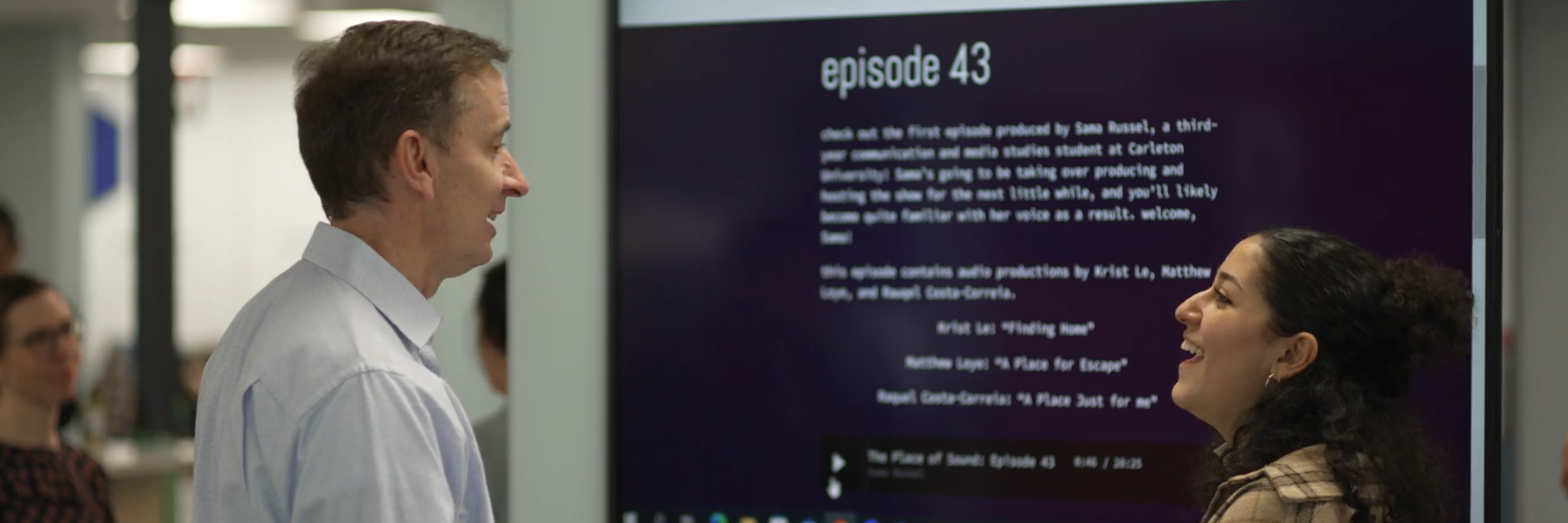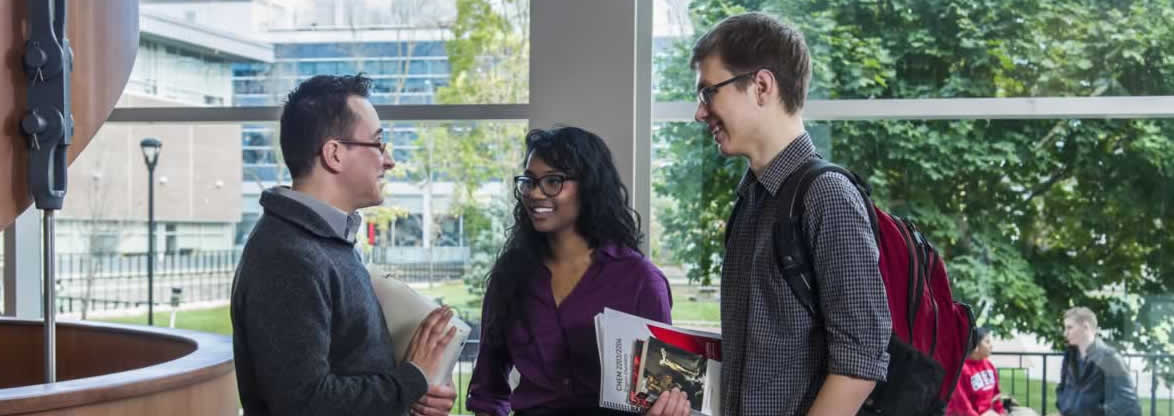Relationships with and among students improves their learning, skill development, sense of belonging, graduation rates, and helps to reduce barriers for marginalized or overwhelmed students. This webpage shares Peter Felten’s work on the positive impact of relationships in higher education, as well as practical strategies and Carleton-specific resources for instructors.
In this video, Peter introduces Relationship-Rich Education:
 Meet Peter Felten, PhD: Peter brought his expertise to Carleton as a Fulbright Canada Distinguished Chair in the Scholarship of Teaching and Learning (SoTL) in 2022-2023, and co-authored Relationship-Rich Education: How Human Connections Drive Success in College with Leo M. Lambert.
Meet Peter Felten, PhD: Peter brought his expertise to Carleton as a Fulbright Canada Distinguished Chair in the Scholarship of Teaching and Learning (SoTL) in 2022-2023, and co-authored Relationship-Rich Education: How Human Connections Drive Success in College with Leo M. Lambert.
Peter Felten is professor of history, executive director of the Center for Engaged Learning, and assistant provost for teaching and learning at Elon University. Peter has written extensively about undergraduate education, including six books, and has served as president of the International Society for the Scholarship of Teaching and Learning (ISSOTL).
Click on the following headings for information and practical strategies. All hyperlinks will open in a separate tab/window.
- What is Relationship-Rich Education?

Felten and Lambert’s work emphasizes the positive impact of relationships in higher education between and among students, staff and instructors. Even (and especially) time-pressed instructors with large classes can foster meaningful relationships and interactions, resulting in powerful and long-lasting effects for students.
The four guiding principles of Relationship-Rich Education are:
- All students must experience genuine welcome and deep care.
- Relationships are a powerful means to inspire all students to learn.
- All students must develop webs of significant relationships.
- All students need meaningful relationships to help them—and to challenge them—to explore the big questions of their lives.
- Why is Relationship-Rich Education Important?
-

We are all connected and what we do matters. Every student deserves to experience powerful human interactions; these can ignite a ‘fire of passion’ about specific topics, disciplines, and their own capabilities.
Why is it important to put conscious attention on relationships within higher education?
- Peer-to-peer, student-faculty, and student-staff relationships facilitate a sense of belonging for all involved, deepen students’ learning and leadership abilities, improve retention and graduation rates, and help students to develop important skills such as critical thinking and communication skills.
- Encouraging significant relationships in education helps to reduce barriers for marginalized or overwhelmed students, and to introduce new and first-generation students to university traditions, ‘codes’, expectations and culture. (Felten & Lambert, 2020, p. 5)
- Meaningful relationships in higher education can also enhance the four Teaching and Learning directions in Carleton’s Future of Teaching and Learning initiative: empowering, collaborative, flexible, and sustainable.
- How Can I Foster Relationship-Rich Education?
-

Ideally everyone on campus would see themselves as part of a “web of important interactions students will experience.” (Felten & Lambert, 2020, p. 10) All teaching and administrative staff are important to the relationship-rich campus. As an instructor, you can harness the power of relationship-rich education by engaging in some or all of the following activities (don’t forget to include them in your teaching portfolio).
Learn More about Students’ Experiences
Encourage Students to Explore the Power of Relationships in Education
- Encourage students to download and read Felten et al’s free student’s guide to building the connections they need to thrive in and after university.
- During class, promote student engagement with their peers and you through Brightspace groups, peer assessment, interactive techniques (active learning activities) and experiential learning, whether in-person or online.
- Urge students to connect with other students, the student experience office’s many programs, mentorship programs, campus staff and programs, and campus life and wellness resources by providing information in your syllabus, lectures, and discussions.
Use Practices and Tools to Promote Impactful Relationships and Student Success
- In your learning-focused or ‘promising’ syllabus, as well as in assessments and classes, communicate clear learning outcomes that students can work toward WITH you. This makes it apparent that your expectations aren’t arbitrary or personal.
- Ask students what they want to be called, and to use name labels during class.
- Help students see their doubts or lack of knowledge as common but also temporary and surmountable.
- Capitalize on one-on-one interactions to practice ‘mentoring conversations’ (even without a more formal or more extensive mentoring relationship).
- Redesign office hours for a variety of uses and reduce students’ trepidation. For example, encourage students to bring a fellow student with them. If you have time, you could try different locations to establish relationships and encourage students who otherwise might see asking for help as ‘cheating’ and intimidating, or combine office hours with therapy dog visits.
- Provide effective feedback on assessments (convey high standards, show belief in students’ ability to meet them, and provide specific guidance on how to meet the standards). Choose the most impactful technology and format for the feedback (perhaps video or audio format in Brightspace?).
- Scale up interactions for large classes, through peer discussion and peer feedback exercises.
- Try Brightspace’s Intelligent Agents to increase instructor presence (and therefore student support). Measure student engagement and disengagement in a course, and identify students who might benefit from increased communication. Use custom or pre-developed Communication Agents to automate and more easily check in with students.
- Read an overview of ‘humanizing’ your online courses and more material by Michelle Pacansky-Brock for course elements and activities to reduce students’ isolation and disconnection.
- Selected Resources and References
-

Resources for instructors and administrators
- Peter Felten and Leo M. Lambert’s book Relationship-Rich Education: How Human Connections Drive Success in College draws on nearly 400 interviews with students, staff and faculty at 29 post-secondary institutions, and provides practical advice on developing powerful relationship-based learning, even in large classes and institutions. It is also available online for Carleton community members.
- Felten et al created a free downloadable guide for students, Connections Are Everything: A College Student’s Guide to Relationship-Rich Education, that instructors can mention to students. (Also see the Carleton-specific resources in the ‘Encourage Students…’ section of the ‘How Can I Foster Relationship-Rich Education’ section above.)
- Becky Supiano’s article in the Chronicle of Higher Education’s Teaching newsletter features Carleton University’s professor Martha Mullally and her approach to connecting students with each other (this link may require an individual free Chronicle newsletter account).
- Becky Supiano’s article in the Chronicle of Higher Education discusses several examples and benefits of “the social classroom” (this link will work on Carleton campus and remotely for CU staff that have signed into the library website).
- Dr. Mirjam Glessner’s blog post provides a summary of, and reaction to, Felten and Lambert’s book.
- Maria Scalzi Wherley and Jane Sutterlin’s blog post provides practical tips for three areas that promote relationship-rich education: learning students’ names, valuing persistence, and mentoring.
- Elon University’s 57-minute video provides features students’ discussion of the impact of impact of Felten and Lambert’s recommended mentoring practices.
References
Felten, Peter, and Leo M. Lambert. Relationship-Rich Education: How Human Connections Drive Success in College, Johns Hopkins University Press, 2020. ProQuest Ebook Central, https://ebookcentral-proquest-com.proxy.library.carleton.ca/lib/oculcarleton-ebooks/detail.action?docID=6371405.
Pedagogical and Technical Support
Whether you need a thought-partner on pedagogical approaches, or help with technical aspects of educational technology, TLS is here to support you. Connect with our Teaching and Learning Services staff via our ‘Get Support’ page.
Was this page helpful?
1432
29e11b3478
Thank you for your feedback.
6 people found this useful
Still need help? Contact us
Posted in Engaging Your Students
Share: Twitter, Facebook
Short URL:
https://carleton.ca/tls/teachingresources/?p=1432
 Meet Peter Felten, PhD: Peter brought his expertise to Carleton as a Fulbright Canada Distinguished Chair in the Scholarship of Teaching and Learning (SoTL) in 2022-2023, and co-authored Relationship-Rich Education: How Human Connections Drive Success in College with Leo M. Lambert.
Meet Peter Felten, PhD: Peter brought his expertise to Carleton as a Fulbright Canada Distinguished Chair in the Scholarship of Teaching and Learning (SoTL) in 2022-2023, and co-authored Relationship-Rich Education: How Human Connections Drive Success in College with Leo M. Lambert.


